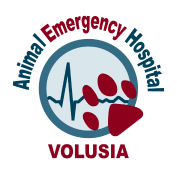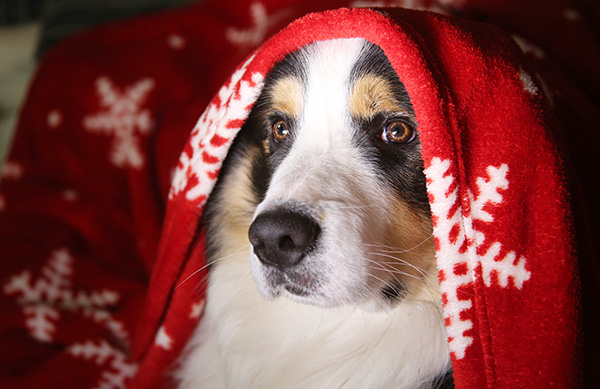The holiday season is a time for celebration, joy, and spending quality time with friends and family members, both two- and four-legged. Unfortunately, this time of year we often see an increase in emergency visits for cats and dogs. So, to ensure that Fluffy is at home with you rather than at the emergency room, be sure to follow our important Christmas and Hanukkah pet safety tips.
Secure Christmas Trees and Other Decorations
Animals are curious and may be tempted to chew on or swallow decorations. Cats, in particular, are attracted to sparkly, shiny things, and ingested tinsel can lead to intestinal blockages, sometimes requiring emergency surgery. Keep all decorations, including ornaments, out of your pets’ reach, or use plastic decorations. Remember that many ornaments are made of ceramic or glass, which can cut your pet if broken.
Secure your Christmas tree to the wall or ceiling to prevent it from tipping over. Curious cats may be tempted to climb up the tree, which could result in serious injury if it topples onto them. When you are away from home, place a fence around your tree or keep your pet in a separate room.
Keep Pets Away from Electric Lights
Electric Christmas lights and extension cords can be safety hazards; they may cause electric shock if chewed by pets. Cover your cords with electrical tape or wrap them along the walls and away from the ground.
Keep the Menorah Out of Reach
While it is fun to include your four-legged friend in the Festival of Lights, a curious pet might get too close to the Menorah and get burned or singed by open flames. When it is lit, keep the Menorah out of your pet’s reach, or use flameless candles instead.
Create a Safe Space
Not all pets will be in a festive mood, and for some, even a few visitors may lead to stress and anxiety. If you are hosting a holiday party or having out of town guests, keep anxious dogs and cats in a separate room with a safe toy, their favorite treats, and a bed or blanket so they can relax. Advise your visitors to close all doors on their way in and out. And make sure your pet’s ID tag information is current and on them at all times.
Before visitors arrive, make sure to give your pets plenty of attention, such as an extra walk in the morning with your dog or a bit more playtime with your kitty’s favorite feather – you may enjoy the extra time with your pet too.
Do Not Feed Your Pets Human Holiday Treats
Keep all chocolate, and gifts that could contain chocolate away from your pets – even if they are wrapped in a box, including Advent Calendars, Hanukkah gelt and stocking stuffers.
This is also true of sweets containing xylitol. Many low-calorie and sugar-free sweets and gum, and even some types of peanut butter, contain this natural sweetener. Xylitol is extremely dangerous to dogs, as it can cause low blood sugar and liver failure.
And many nuts can be harmful as well! Peanuts, cashews, and small hazelnuts are OK in small amounts, but say NO to almonds, walnuts, macadamia nuts, pecans, pistachios, and hickory nuts. As mentioned in our Thanksgiving pet safety blog, the following traditional holiday foods are dangerous for both cats and dogs, even in small amounts:
- Turkey skin is extremely fatty, and even a tiny amount of fatty foods can cause pancreatitis in animals – a life-threatening condition indicated by vomiting, lack of appetite, and belly pain.
- Bones can quickly get stuck in the throat or damage the digestive tract. Both are life-threatening conditions that often require emergency surgery.
- Garlic, onions, grapes, raisins, alcohol, dairy products, salt, sugar, yeast dough, and chocolate are all extremely toxic to pets.
Keep Toxic Plants Out of Your Home
Here in Florida, we are lucky enough to have warm weather year-round that allows for unique plants, including Sago Palms. However, the seeds from Sago Palms are extremely toxic and can cause life-threatening liver damage to a pet. If you are adding some new plants to your home for the holidays, please do not plant a Sago Palm if you have a dog or cat.
Holiday favorites like Mistletoe can cause vomiting, nausea, and diarrhea. It can also result in cardiovascular problems. Holly can also cause vomiting, diarrhea, drooling, and lethargy. Poinsettias are beautiful plants that can help any room look festive but can make cats mildly sick if ingested. The good news is that you can find plastic versions of all of these plants for your holiday decorations.
Pets may not exhibit any signs of having eaten something poisonous until several hours later. If you suspect your pet has ingested something potentially toxic, don’t wait. Seek emergency care promptly. We also recommend saving the ASPCA poison prevention phone number, (888) 426-4435 to your mobile phone.
Be Prepared for an Emergency
If you are heading out of town or leaving your pet at home, make sure your pets are wearing their ID tags and are microchipped, and that all of their information is up to date. For pet families that are traveling, it is essential to research the nearest 24/7 animal emergency hospital along your route and at your final destination.
Happy Holidays from Team AEHV
We hope you find the above pet safety tips valuable in your holiday planning. We wish all of our clients and their fur babies a very happy and safe holiday season.

